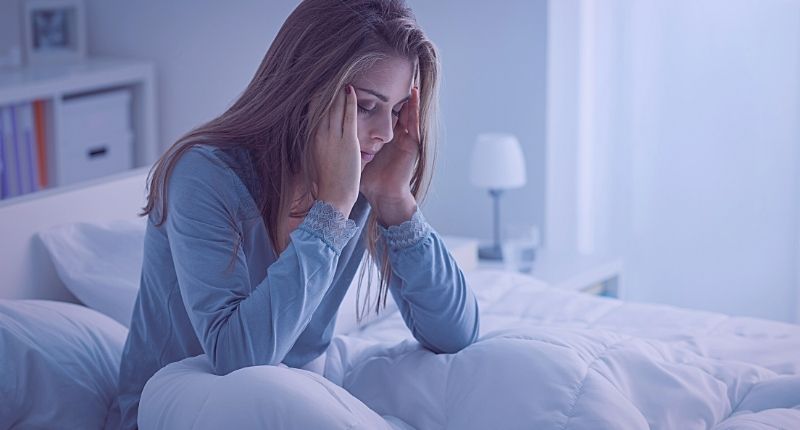Do you often find yourself struggling to sleep at night? Falling asleep and staying asleep is a global epidemic that troubles two-thirds of the world’s population. Sleep issues such as insomnia or daytime sleepiness has people searching for promising solutions, and CBD supplements may be one of them.
Let’s take a look at a common sleep issue, and the positive role CBD might play in putting a stop to your restless nights and have you sleeping like a baby.
What Is Insomnia?
Insomnia is a widespread sleep disorder that makes it difficult to fall asleep or stay asleep due to various factors. Cases of insomnia fall under two categories: short-term insomnia lasting less than three months and long-term insomnia lasting more than three months.
The most common side effects of insomnia may include, but are not limited to:
- Fatigue
- Lack of concentration
- Depression
- Anxiety
- Irritability
- Poor memory
What Is CBD & the Endocannabinoid System?
Cannabidiol, more commonly known as CBD, is found in hemp plants. It is one of the naturally occurring compounds found in the plant, along with THC. Unlike THC, CBD does not have psychoactive effects that lead to the feeling of being “high.”
Some potential benefits of CBD are as follows:
- Sleep aid
- Reduced anxiety
- Pain relief
- Anti-inflammatory
- Mood regulation
- Weight loss
Scientists believe these benefits come from CBD’s interaction with the Endocannabinoid System.

The Endocannabinoid System is a complex biological system with receptors spread throughout our bodies that help regulate a variety of metabolic processes. This cell signalling system regulates sleep, temperature, immune response, appetite, mood, memory, reproduction, pain, and fertility.
When the body is unbalanced, the Endocannabinoid System responds by releasing Endocannabinoids to naturally restore balance. How cannabis supplements work in the body is through their cannabinoids. So cannabinoids, one being CBD, take on the role of naturally occurring Endocannabinoids by binding to receptors and send signals around the body to support regulation.
It must be noted that products derived from the hemp plant like CBD are not recognised as having medicinal benefits. CBD products must be marketed and sold strictly as food supplements as only small scale research studies have been carried out using CBD so far. Despite a host of anecdotal evidence from customers of CBD oils, more research evidence is needed to give CBD the status of ‘health treatment’.
What Is a CBD Oil Supplement?
CBD oil is made by extracting CBD from hemp plants and combining it with a carrier oil like MCT oil or hemp seed oil. The oil can then be ingested into the body just as any other supplement or vitamin.
CBD has recently planted its roots in the health and wellness world and has become increasingly popular for both men and women. However, it’s more common for women to use oil than men, and more frequently as well.
CBD contains amino acids, vitamins, minerals, and essential fatty acids similar to those found in a healthy and balanced diet. It also contains some of the same compounds in supplements you might take to boost your immune system.
A few of the essential vitamins and minerals that can you can find in CBD are as follows:
- B-complex vitamins
- Proteins
- Omega-3 and Omega-6 fatty acids
- Calcium
- Iron
- Magnesium
When someone is deficient in Vitamin D, their Endocannabinoid System can decrease cellular signalling. In theory, Vitamin D and CBD oil together will recalibrate your Endocannabinoid System giving your body a better chance to recover.

Overall, CBD oil presents many possible benefits and very few risks. Some of the possible side effects include:
- Dry mouth
- Diarrhea
- Reduced appetite
- Drowsiness
- Fatigue
Although it is sold legally in most countries around the world, it is currently only FDA-approved for the treatment of two types of epileptic seizures. Further research is needed to deem it FDA approved for treating symptoms such as insomnia, anxiety, pain, and so on.
What Is Melatonin & Can I Use It for Sleep?
Melatonin is a natural hormone found in your body that regulates your sleep cycle. Although it is your body’s job to produce sufficient melatonin levels, certain factors such as stress and ageing can decrease its production, leading to poor sleep quality.
Many CBD brands are now combining the natural powers of melatonin and CBD. CBD oil supplements are being produced specifically for sleep and nighttime benefits.
Can CBD Help with Symptoms of Sleep Disorders?
Research is growing around the topic of CBD as a health food supplement. The potential effects of the cannabinoid compound CBD, found in the hemp plant, are up for positive discussion as more people trial a daily dose of CBD in their diet for the improvement of sleep.
One study looks at the use of raw cannabis flower in the treatment of insomnia and concludes by highlighting improvements in the subjects’ sleep quality. However side effect profiles and degree of effectiveness varied between participants. Such differences are common within the CBD industry for example as CBD users vary in terms of the dosage they take and the tolerance they have to various cannabinoids.
Another sleep disorder, Obstructive Sleep Apnea or OSA, was the base of another study used to determine the effectiveness of cannabinoids on the body and mind during sleep. Improvements in patients are noted once again in the concluding notes of this study with cannabinoids causing lower AHI, plus more treatment satisfaction from those undergoing the trial.
How to Use CBD Oil Supplements for Sleep?
You can ingest CBD Oils for sleep in various ways, including:
- Tinctures (drops)
- Topical lotions or creams
- Capsules
- Inhalers
- Food and drink
When choosing a CBD product, it is important to pay attention to the ingredients. The three different types of CBD: isolate, full-spectrum, and broad-spectrum.
Isolate is pure CBD and contains no other compounds that are found in hemp plants. Broad-spectrum contains all components of a hemp plant besides THC. Full-spectrum CBD oil contains all the cannabinoids of the hemp plant, with THC levels less than .03%. If you are looking to receive the full benefits of CBD oil, it is best to opt for full-spectrum CBD.
Focusing on quality ingredients from a reputable brand is also key in choosing a good product. Pay attention to the amount of CBD as an active ingredient per serving and any other included ingredients such as added flavours or melatonin for oils tailored towards sleep.

Product strength is important to assess when picking your product and determining your dosage. CBD is biphasic, meaning too much or too little can create the opposite effect desired. Sleep issues do not need strong levels of CBD to resolve. Lower to middle strength oils are ideal. This ranges from 5% (500 mg) oils to 10% (1000 mg) oils. Taking any doses lower than this can be ineffective, while taking any doses higher than this could make health issues worse.
The frequency of use will be dependent on each person and product. In time, you will gain a personal preference regarding when you like to take your supplement. It is usually recommended to take CBD oil every day in the mornings.
Surprisingly, you don’t need to take it before bed to go to sleep. The CBD builds up in your system over time so be sure to be consistent and take a dose every day for best results. If you want, you can take your dose a few hours before bed but not within two hours of sleep. As for safety, CBD product testing reveals the levels of cannabinoids present in the product. Tests assess purity and expose any toxic chemicals that may be present.
Conclusion
Just like any other supplement, if you are taking regular medication it is important to consult with your doctor or pharmacist before CBD use. You can always leave a two hours between any CBD dose and regular medicines to ensure neither interferes with the other product. Once you decide to try out CBD supplement, research which might be the best sleep solution for you. If you’re consistent, you’ll be in dreamland soon enough.

